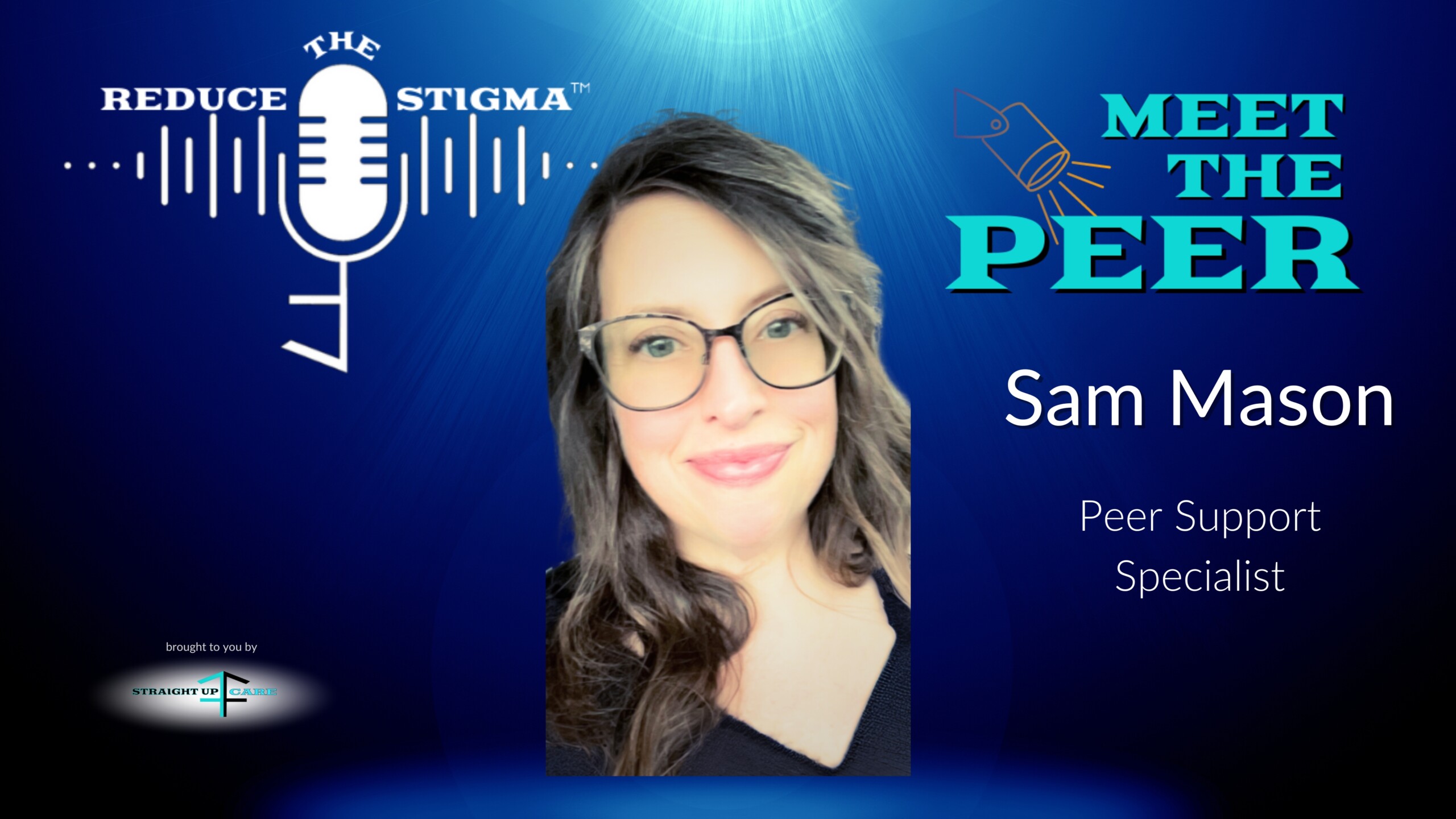Meet The Peer: Sam Mason, Peer Support Specialist
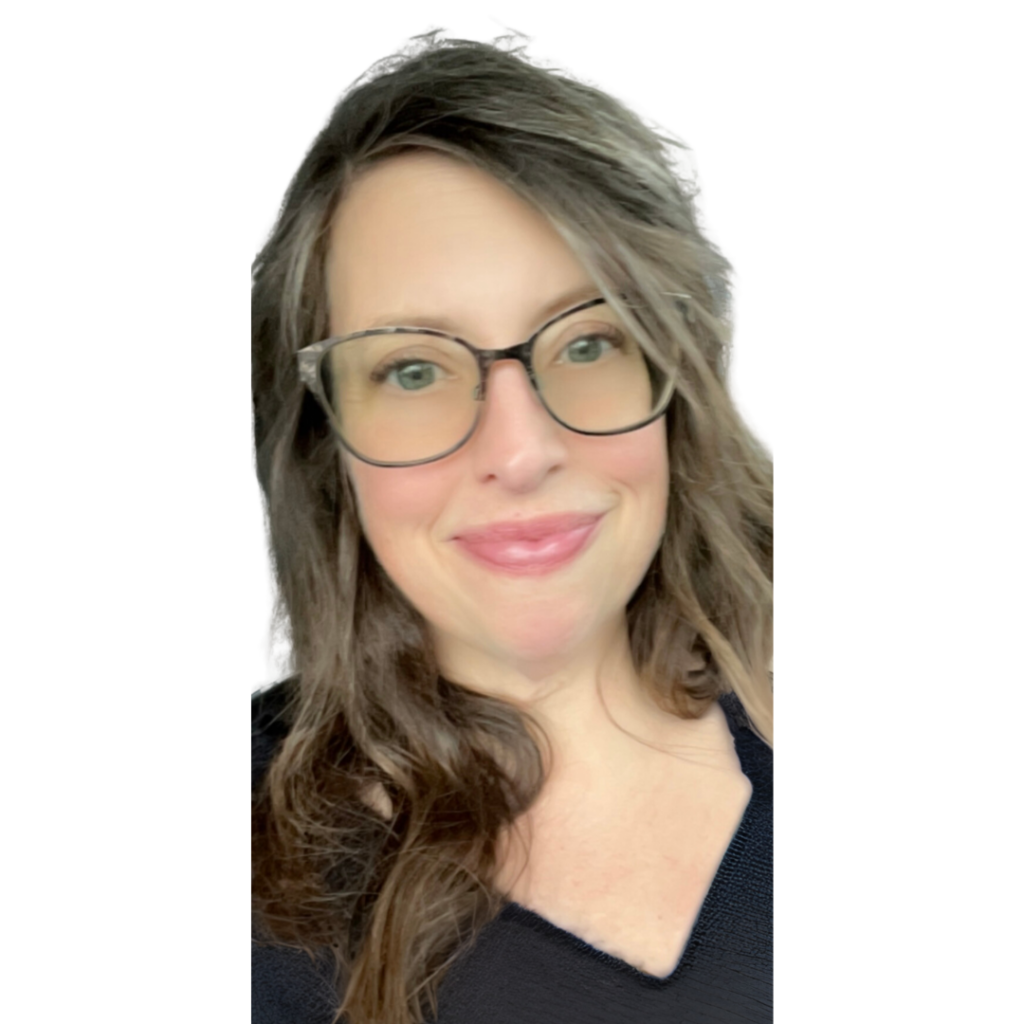
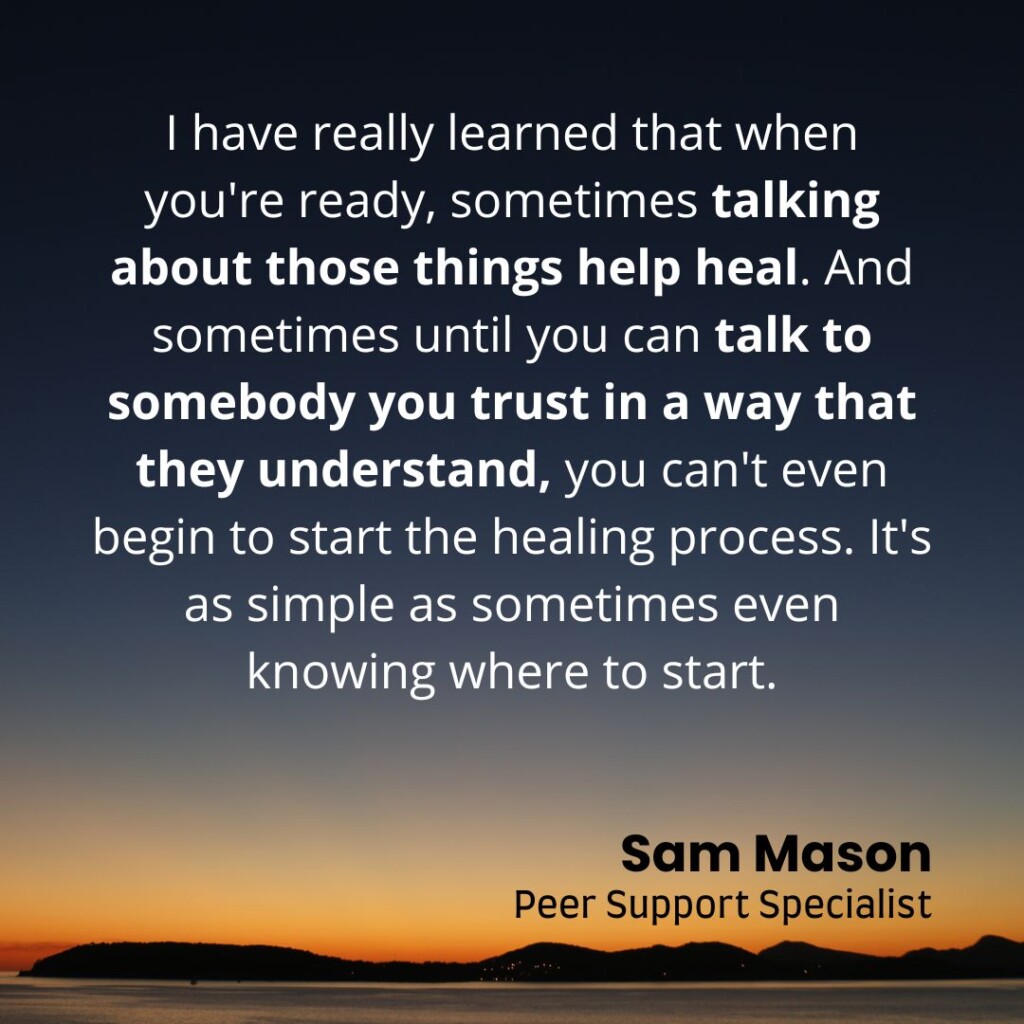
Support comes in many forms, but few are as profound and empathetic as the insights shared by someone who has the same lived experience. Sam Mason, a peer support specialist based in South Dakota, joins host Whitney Menarcheck on Meet The Peer to share how finding the person you can trust with your story can be an essential step on the healing journey. Sam shares her experience as the loved one of someone with substance use disorder, highlighting the necessity that those who love someone with a substance use disorder be offered support themselves. Additionally, she shares her experience surviving unhealthy relationships and how stigma can stop someone from seeking the support they need.
Connect with Sam: https://straightupcare.org/appointment-schedule/5411133
How to Watch
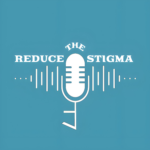
Watch on any device on ReduceTheStigma.com

Install and Watch all Episodes on Reduce the Stigma RokuTV Channel

Install and Watch all Episodes on Reduce the Stigma Amazon Fire TV Channel
How to Listen
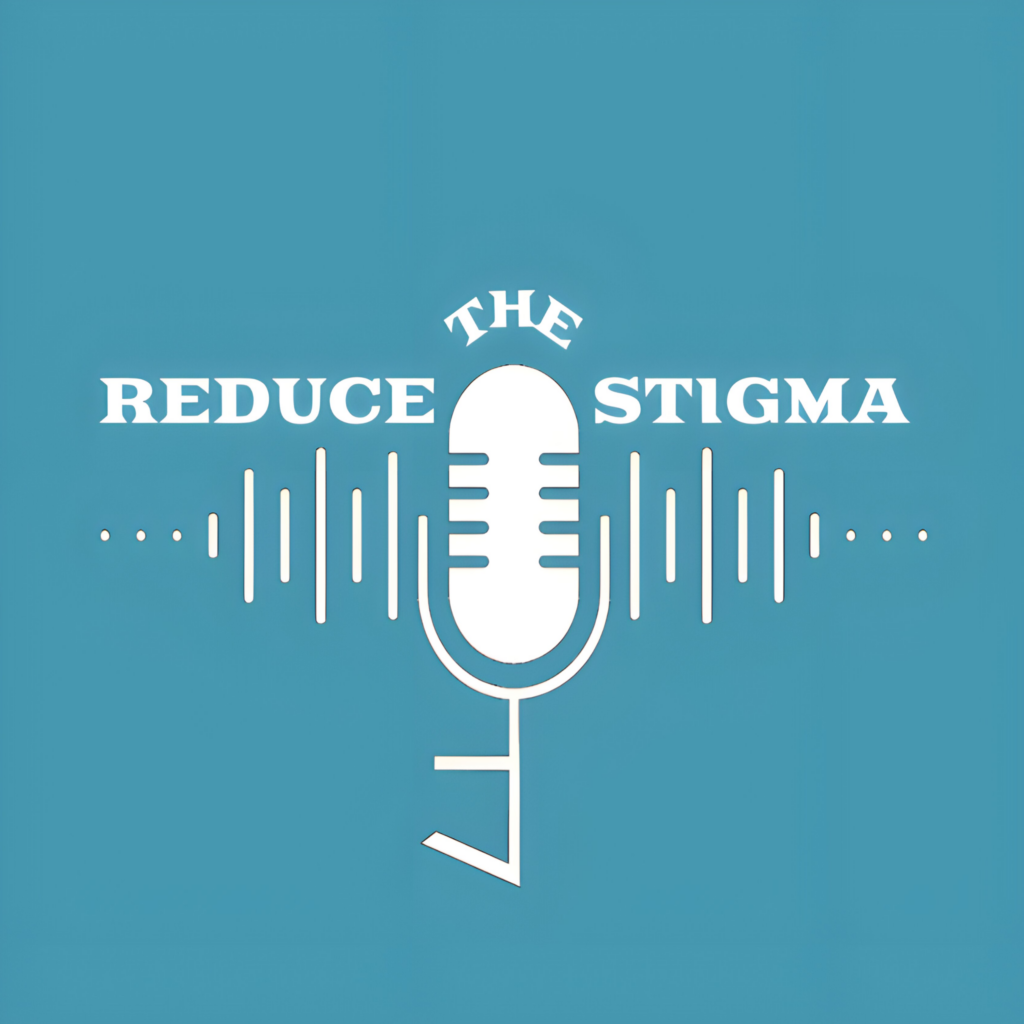
Our Podcast Website on Podops!
Listen on Apple Podcasts!

Listen on Spotify!

Listen on iHeart Radio!

Listen on YouTube Podcasts!
Transcript
Whitney Menarcheck | she/her (00:00)
In the spotlight today is Sam Mason, a peer support specialist in South Dakota. Sam shares two perspectives, one that of the loved one of a person with substance use disorder and the other as someone who has survived unhealthy and dangerous relationships. As the loved one of someone with a substance use disorder, Sam discusses the way that we can support that person as well as others who have loved ones with a substance use disorder by doing things such as carrying Narcan. sharing her lived experience in unhealthy relationships and quite frankly dangerous relationships, Sam speaks to the lasting toll that those relationships and survival actions have on an individual and what it means to move forward. So stay tuned and get ready to be inspired as we reduce the stigma.
Whitney Menarcheck | she/her (02:02)
Hello and welcome to Meet the Pier. With me today is Sam Mason, a peer support specialist in South Dakota. Welcome, Sam.
Sam Mason (02:11)
Thank you.
Whitney Menarcheck | she/her (02:12)
Thank you so much for joining me today. As I understand, you are a relatively new peer support specialist. You finished your training maybe a month or so ago, is that correct?
Sam Mason (02:23)
Yes, it was the beginning of March that we finished training and I was able to get my certification to be a certified peer support specialist.
Whitney Menarcheck | she/her (02:31)
So exciting, congratulations. And I want to hear about what led you to do that, but before we get there, there’s a lot of people that don’t know what peer specialists are or what they do. In your words, how would you describe what peer support is?
Sam Mason (02:34)
Thank you.
So peer support is really somebody who’s had a shared lived experience similar to the one that you’ve had and can help offer resources and offer a safe sounding board for things that you might need to share. So that way, if you need to talk to someone, there’s someone available there to help offer guidance and education about different things that might be available to help the particular circumstance you’re in.
Whitney Menarcheck | she/her (03:15)
That’s great. And you mentioned lived experience, shared lived experience. That is the key component of peer services. It’s being able to talk to someone who really gets it in a different way. And so, of course, then that means you have certain lived experiences that you’re going to be offering support for. And I imagine that’s part of your journey to becoming a peer specialist. What exactly is it that led you? What lived experiences do you have that you’ll be supporting others with?
Sam Mason (03:45)
So while I was growing up, I unfortunately had some experience with abuse and that led to me feeling as if that was the norm for my life and the expectancy. So as adulthood came on and I started being involved in relationships with significant others, that was kind of the bar that I had set for myself was that it was okay for me to continue being mistreated. There was a lot of sadness and depression and some self harm involved in that journey, feeling like I was not worthy and that I didn’t really need to be anyone in existence because I wasn’t beneficial to any single person on the planet. Through those relationships, I ended up in a very serious relationship with a significant other that unfortunately… led to some substance misuse for that person. And I had to support them through that journey. He went to rehab a few times while we had a family together. And it was a very difficult journey. And when I realized that I was worth more than the little bit that I thought I was worth, I had left, which is a whole lot of baggage to pack when you’re trying to start over and you’ve lived your life a whole certain way for 35 years and I had passed some of the knowledge of the way that I felt like I should be treated on to my children and that left a lot of unpacking for them if you will so we had to really grow and flourish as a family. Upon coming to South Dakota, there was some violence that I witnessed, which also caused additional trauma and a lot of setbacks. And while moving closer to the family that I had, it opened some doors for relationships that hadn’t been there when I was younger, but it also opened the doors to some relationships that had been in existence when I was younger. So that had become. continued journey to try to work through those things. While here in South Dakota in the last 20 years, I have had a couple loved ones that have had some trouble with substance misuse that I have been able to support and help through that situation. Kind of really being a difficult spot sometimes to know where you should stand and how to best support somebody who is suffering that way. I had to make some really hard decisions during that time, but things did pan out for the better now and things are much better for them and our relationship has reformed in a way that it should. I also have had some experience with other people that we’ve become close to here in South Dakota that had some significant depression and one had an unsuccessful attempt on his life and I was able to help support him through that and be a strong rock for him while he worked through things and offer some resources and guidance. So those lived experiences that I have are something that I’m willing to share with other people because that whole moment where you say something out loud and the whole room goes quiet and you realize that you’ve said something that’s not the norm, I understand that. I get that.
Whitney Menarcheck | she/her (07:12)
Yeah.
Oh, well, thank you for sharing all that. There’s so much there that I would love to kind of discuss further. And I have to go right to that last thing you just said. So when you say something in the room and it goes quiet, because it’s not the norm or what have you. And I can’t help but think that it’s all I wonder if it’s because it’s not the norm or it’s because The norm is that we never talk about those things.
Sam Mason (07:46)
I think it’s a little bit of both, but I have really learned that when you’re ready, sometimes talking about those things help heal. And sometimes until you can talk to somebody you trust in a way that they understand, you can’t even begin to start the healing process. It’s as simple as sometimes even knowing where to start.
Whitney Menarcheck | she/her (08:09)
Right. And that trust, is there any insight you could share with us about the unique connection between two people and what it means to be able to talk to someone who’s been through a similar experience? What do you think? Why is that trust different?
Sam Mason (08:29)
That trust is different because they understand where you’re coming from.
My brother and I talk often, we grew up in that environment together. We grew up together. And so we understand. And sometimes when we’re talking, other people are just like, Whoa, but we get it. And it’s okay, because we validate each other for those feelings that your feelings are not invalid. How you feel is absolutely okay. And to have somebody who can say, it’s okay to feel that way. And let’s talk about that some more can be very beneficial in soul healing.
Whitney Menarcheck | she/her (09:07)
Absolutely. And when someone else has been through it, there’s, you know, we hope that everyone would be non -judgmental, especially any healthcare professional. I think, though, that it’s understandable that there can be some hesitance to be completely open because, but have they heard this yet? You know, whereas someone who’s been there, they’ve not only heard it, they’ve lived it, they’ve done it, they’ve been the one saying it.
Sam Mason (09:34)
Absolutely.
I had that experience, unfortunately, with some healthcare providers of sharing information that was not understood very well. And there was some judgment there that was pretty quick. And unfortunately, I wish I would have met the people that I know now when I was ready to start talking about things, because it would have been a lot more beneficial for me to have somebody who said, Oh, wow, that really stinks. How do we work through this instead of, Oh, let me do this for you and prescribe a medication to make you forget it all because sometimes healing from trauma is not about forgetting it all. It can be for some people but not everybody.
Whitney Menarcheck | she/her (10:15)
Great. And I can’t help but think of how dismissive that is. Let me just write you a script for a pill to fix it. You know, this pain. I’m just gonna get my little pad out.
Sam Mason (10:28)
Yeah, because that doesn’t always do it. Sometimes it’s a lot deeper and forgiving yourself is a huge part of it.
Whitney Menarcheck | she/her (10:35)
Now, going back to some of the things you’ve shared, you talked about learning what you thought was the norm. You know, you learn, you grew up in a certain way, or you had certain experiences where that’s just how you thought things were. I think a lot of times people forget that when they’re interacting with an adult, that there’s a child that had you know, maybe misperceptions about things or their reality was a certain way. Can you talk about what it’s like to realize that what you thought was just how certain things were, that there could be a different way?
Sam Mason (11:25)
One very good example is I have something in my bedroom called a jump bag. And in that jump bag is all of our birth certificates, important documentation, everything in case we got to go. And that was something that was formed through traumatic relationships of knowing that the things that I needed to save would be there because there’s not pictures of my brother and I when we were little, because the things that needed to be saved weren’t where they needed to be. all my daughters have jump bags and it’s the norm in our house and we were talking about that in a group of people and somebody went that’s not normal and I had to think about that because that’s the normal that I’ve always had is you’re prepared to go if you got to go and those things sometimes can be overwhelming because for somebody else to say that’s not normal, that’s you’re packing a trauma bag. No, that’s not what it is to me. It’s proactive, but just those kinds of things that you do that become part of who you are. make a huge difference. People that have been through trauma that self -sabotage because we’re waiting for the other shoe to fall and we minds will drop it ourselves because we can control that and we can control that situation. Learning how to stop that behavior and work through that behavior and accept the good things that are in life and welcome good things can be a huge difficult task for somebody that’s not used to having good things be visible to them.
Whitney Menarcheck | she/her (12:47)
right.
Right? In the control you spoke of, you know, trauma is a result of things being completely out of our control and our sense of safety being threatened, whether it’s real or perceived threat to our safety. And so as a coping skill, you naturally start taking control of what you can control because then you feel more likely to be able to survive.
You had the jump bag not only for pictures, but because you needed to be able to get out of there fast and rebuild. And so you were taking, like you said, proactive steps. Is it ideal that you have lived a life that you’ve had to have that type of jump bag and then your children had to learn to have a jump bag too? No, however, it was necessary.
Sam Mason (14:04)
and it’s just… It goes to show that when you have your own trauma, how you can pass that along without even meaning something that’s innocent of keep all your stuff together in one spot in case you got to leave right away becomes this is your life bag. Literally, as you said, a way to start over everything you need to start over is in this bag. And that was passed along inadvertently. And it hurt my feelings when I realized that maybe it was something.
Whitney Menarcheck | she/her (14:30)
Right.
Sam Mason (14:34)
something different than I thought it was. Have I gotten rid of the bag? No. Is it in the same place? Yes. Have I told anybody else to get rid of it? No. Do I sometimes tell people that having a jump bag is a good idea? Yep. Will I continue to do that? Probably.
Whitney Menarcheck | she/her (14:49)
Yeah, I mean, the reality is that there are people who should have a jump bag. We can’t, it’s not appropriate to look down on someone for having that jump bag. We need to recognize there is a reason and we need to appreciate and respect that reason.
Sam Mason (15:10)
And that’s the benefit of a peer support specialist. Having that lived experience so that they can identify and understand what you’re trying to say because they’ve been there is a huge benefit because there’s not judgment. It’s not, oh my gosh, this happened to you? It’s how do we help here? What can we do to make this better? That’s the benefit.
Whitney Menarcheck | she/her (15:34)
Absolutely. And you mentioned having loved ones that have had their struggles with substance use. And we don’t often think about anyone other than the individual with a substance use disorder or the addiction or mental health needs as the one who could benefit from peer services. That’s who we think of. In reality, though, the loved ones, the people who’ve been impacted as well, not only
Do they, you know, not only can they access it, but they deserve it and probably aren’t receiving the support that they may need.
Sam Mason (16:14)
And I think that’s because it’s such a stigma to say that I have a loved one that misuses substances. It’s such a stigma to say that out loud. I had a mom who was a friend that had a daughter that was having some difficulty and she carried Narcan. And because I knew this young lady, I started carrying Narcan. And…
Whitney Menarcheck | she/her (16:24)
Right.
Sam Mason (16:38)
That was as a preventative because I needed her to know she wasn’t alone. It was okay. There isn’t going to be any judgment. It’s just how do we be prepared for what we need to be prepared for. And that stigma of being able to say that out loud in a safe environment of I don’t have this problem right now, but someone I love does and I don’t know how to help them is so very important in order to be able to help the person overcome whatever they’re going through.
because they need a solid support system too. So the support system needs a support system.
Whitney Menarcheck | she/her (17:14)
Yes, absolutely. And you think about how much energy a loved one exerts just worrying and the toll that can take on them, the likely sacrifice of self -care. And so to have someone who can call them out from a place of true understanding.
will truly help them, you know, maybe the outcome with their loved one won’t be any different. However, their ability to continue to cope, to accept, that will be impacted by that peer.
Sam Mason (17:55)
Absolutely, absolutely. And sometimes when you’re in the position of having a loved one, there’s a lot of guilt.
Somebody needs to say, you don’t have to carry that guilt. This is what it is. It’s not your decision, but how do we help support you through this? And also, a peer support specialist having resources, that’s the great thing is maybe they know something at hand that will be beneficial and help all the way around. Because if you feel good and you feel healthy and you feel supported, then you’re better able to support the people that you love as well.
Whitney Menarcheck | she/her (18:28)
Absolutely. And then you think about with that guilt comes the sense that I can’t put boundaries or I have to keep trying and I’m a trained professional counselor. I can talk to a client about boundaries, but I don’t know what it’s like to have maybe a child with a substance use disorder. I do have friends in recovery.
But I’ve never been in the situation where I’ve had to put that boundary as a result of their substance use. And so I’m sure coming from someone like me, you know, the degree professional, it doesn’t have the same thing. And I wouldn’t blame someone for thinking, what the hell do you know? Right?
Sam Mason (19:16)
And you know, if it’s a partner…
And you have to set those boundaries because you can’t do anything any different. Are you sacrificing somebody who helps support your family? Are you sacrificing something that’s bigger? Are your finances going to be unstable? Are you wrecking a family? You know, there’s all these things that fall into play. And if it would happen to be your child, it’s kind of the same parameters. How do you tell a child, you can’t have anything to do with me right now because I am enabling you and I’m not helping you?
The amount of guilt and hurt and feelings that you violated trust while you’re trying to create a boundary to keep yourself safe and protect your own peace can be overwhelming.
Whitney Menarcheck | she/her (20:04)
Right, right. And I think, you know, we hear that term enabling, don’t be an enabler, really doesn’t reflect the challenge that that is and the emotional pain that it, believe me, I think if anyone could snap their fingers and help their loved one reach a better place in their life, they would do it. They would much rather do that than enable, I say in quotes.
Um, all of those actions are out of love and it’s not easy to stop that. I’m sure. And so I can see the significant value to talk to someone who’s put those boundaries, who knows what that anxiety is probably like.
Sam Mason (20:55)
It’s a loved one. It’s someone you love and that’s conflict within itself. It can be very, very difficult and very hard and everybody’s circumstance is going to be a little bit different. And that’s something that’s beneficial to being a peer support specialist as well, because you do have that lived experience. And so it’s not so surprising when somebody says, well, this happened versus when you’re somebody who might just be coming from a clinical background. And it might seem that each situation is very similar.
when in reality you peel that onion back and it’s not similar at all.
Whitney Menarcheck | she/her (21:30)
No, absolutely. Oh, yes. Just my head is going with how important this is and how overlooked of a population that can be supported by peers. So I’m excited to spread awareness through, you know, what you have shared and continue showing that, you know, lived experience, whether it’s mental health addiction, whether it’s trauma or
Anything in life is a valuable asset to help others.
Sam Mason (22:06)
Absolutely, and that’s again the great thing about being a peer support specialist. You can help somebody in a way that you didn’t even know you could help them.
Whitney Menarcheck | she/her (22:14)
Right, right. And so as we kind of start wrapping up, I want to ask you my two final questions that I ask everyone. Can you share a stigma that you have experienced and what would you like us to know about it? That could be a word that was used, an assumption made about you.
Sam Mason (22:38)
They’re a cutter. That person is a cutter.
Whitney Menarcheck | she/her (22:40)
They’re a cutter.
Hmm.
Sam Mason (22:44)
Why would you be defined by something that you do to try to alleviate, alleviate emotional pain when you can’t figure out another way? It’s kind of like being diagnosed with something that’s not a diagnosis. If you have diabetes, you don’t just become diabetic. You know, it’s, it’s a diagnosis. It’s not who you are. It’s a portion of your life at that time, maybe for a long time.
but the real reason is finding out the background of it. So I think those kinds of self -harm behaviors create a huge stigma.
Whitney Menarcheck | she/her (23:25)
Absolutely. Oh, I hate. And I just think about the way the tone that’s probably used with that, the judgment and dismissive and don’t want to go near that kind of mentality.
Sam Mason (23:42)
Absolutely, absolutely of they they cut they’re a cutter. So therefore they’re gonna kill themselves eventually that’s not necessarily what it is and having an unsuccessful attempt on your own life doesn’t label you for the rest of your life either and unfortunately sometimes when people have mental health and they’re not understood it compromises the mental health even more because you feel even more alone.
Whitney Menarcheck | she/her (24:10)
Absolutely. Stigma can be the reason people don’t seek help because they’ve had experiences like you had whenever you were offered a prescription, like someone who may be over here being referred to by a nurse as an addict or a druggie, a cutter. That can be the reason why the next time someone needs help, they don’t ask for it because they haven’t felt supported when they have previously kind of gone down that route.
Sam Mason (24:37)
Absolutely, and hopefully we can help fix that for some people and advocate for some people so that they don’t feel that stigma when they decide they want to find some additional help or they need additional help.
Whitney Menarcheck | she/her (24:49)
Yes. Well, for that person who is listening or watching us have this discussion and they’re having a difficult time right now, what would you like them to hear?
Sam Mason (25:03)
they’re not alone.
even when you are in the darkest of the room, the lights can be turned back on. Sometimes it just takes the right person to walk in and open the door enough that you can see the light to find the light switch.
Whitney Menarcheck | she/her (25:20)
Oh, that’s a beautiful image to think about. And so, Sam, I can’t thank you enough for sharing being open and talking about so many different things about your life and what you are going to be doing to support others. So just thank you for taking the time and sharing your story.
Sam Mason (25:39)
Well, thank you so much for taking the time to talk to me. I appreciate your time a lot.
Whitney Menarcheck | she/her (25:43)
Thank you. And if you are interested in receiving peer support services from SAM, visit straightupcare.com/members. And you can find the link in our show notes. Thank you and have a wonderful day.
Follow Straight Up Care
